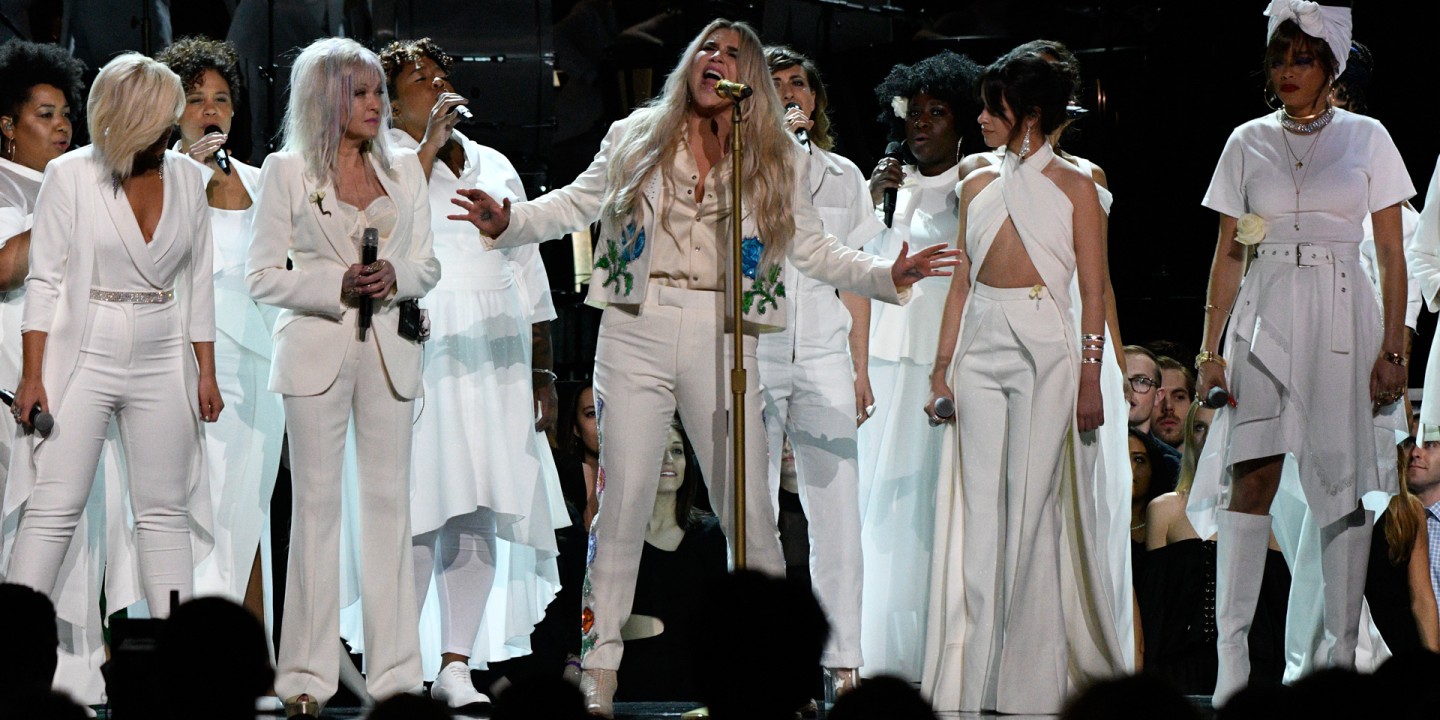The gospel according to Kesha
Kesha’s latest album could have been written by Hagar, Tamar, or Ruth.

Kesha emerges on a stage of women who sing her words in harmony, each wearing white in solidarity and protest. Sunday night at the Grammys she performed her song “Praying,” almost four years after she first filed a lawsuit against her music producer and alleged abuser. It was a perfect tribute to the #MeToo movement—for which Kesha has garnered little attention or credit.
Before Taylor Swift was suing a radio DJ for groping her backstage, there was Kesha. Knowing what happened to her, it’s difficult for me to listen to her 2010 debut studio album. Animal is super-pop fringed with vocal fry and adages about brushing teeth with whiskey. I’ve loved Kesha’s irreverent hype from the moment it first blasted onto my radio. But now when I hear these songs I’m reminded of the hell Kesha was living through as she recorded and toured Animal.
In 2005 Kesha signed to Kemosabe Records, a Sony imprint run by producer and songwriter Dr. Luke (Lukasz Sebastian Gottwald). She was still a teenager and a protégé of Dr. Luke, who helped launch her career.
During the production of hits like “Tik Tok” and the anti-bullying anthem “We R Who We R,” Kesha was trying to stay alive. Years later she would report ongoing sexual, physical, and mental abuse by Dr. Luke, allegations he denies. In a lawsuit filed against the producer she explains how he gave her drugs to make her sexually submissive, and bullied her about her weight. Kesha would later spend time at a rehab clinic recovering from an eating disorder.
Like many women, I watched with horror as the story unfolded. Long before #MeToo was a household term, Kesha was largely alone in her public battle. But it would get worse. Kesha wanted to be released from her contract with Sony to get away from Gottwald. In October 2014, she filed a lawsuit to void contracts with Dr. Luke and his subsidiaries.
Gottwald countersued, and the New York Supreme Court sided with the label. “There has been no showing of irreparable harm. She's being given opportunity to record," claimed the judge. With nowhere left to go, Kesha moved on with her recording career. Any further music was under the control of Kemosabe. For the length of her contract, Kesha’s employer will be intertwined with her alleged abuser.
When I heard Kesha was releasing a third album, Rainbow, I expected music that would raze the ground. Kesha has the lyrical and musical chops to pull off pure destruction of her enemies, and her trauma would have justified this musical response.
Instead the album is a layered and multifaceted reply to the way her life has unfolded. The result is somber and loud, goofy and brash, astoundingly vulnerable with girl-power punch.
It was providential that Kesha’s album dropped the same week the story of the Canaanite woman showed up in my church’s assigned lectionary reading. There in the Gospel of Matthew Jesus is sarcastic and sneering. He calls a Gentile woman a dog, a dig at a distressed mother begging for the life of her child. “It’s not fair to take the children’s food and throw it to the dogs,” Jesus bites back at her request for divine healing.
The Bible holds within it stories of women like this—maligned and neglected, women who manage to survive personal and societal nightmares. Hagar wanders in the wilderness clutching her starving child. Tamar wastes away as a widow while Judah’s son grows old. Ruth trudges to a foreign land with Naomi, who weeps over her dead children.
They are survivors of rape and incest, brutalized by religious law and social propriety, the waste left in the aftermath of powerful men and women jockeying for a political and personal upper hand. These women consistently work outside the prescribed boundaries of morality, demand more for their lives, and work out their existence in the face of what should be crippling adversity.
Kesha’s album could be written by any of these women, and I hear their voices in the lyrics. I suspect that the woman who meets Jesus at the well, who cautiously draws water at midday to avoid the whispers of gossipers, could belt out the line, “All those mother****** been too mean for too long, and I’m so sick of crying.”
What’s most profound and moving about Rainbow is that Kesha, like each of these women in scripture, reminds us that coming to the other side of trauma looks like many things, makes us many things all at once. She is rigid and soft, silly and brash, and at times both imposing and intimate. There’s a stunning vulnerability in songs like “Praying,” where Kesha reimagines forgiveness as the repentance of her abuser: “I hope you find your peace / Falling on your knees, praying.” Rainbow is stripped of the autotune of her previous work. It is raw and revealing.
Audre Lorde, describing her anger towards racism, wrote “that anger has eaten clefts into my living only when it remained unspoken, useless to anyone.” As I listened to Rainbow, this kind of anger is always present beneath the surface—a surging, creative force that opens up the possibility of other selves: “Trust me, I know, life is scary / But just put those colors on, girl / Come and play along with me tonight,” Kesha sings, her voice parting the wreckage on the title track.
Kesha’s album is for all women, because all women live in a world stacked against us, ready to hand out annihilation. We grapple with a genital-grabbing president, black women’s bodies decimated by prison and police brutality, brown mothers kidnapped by ICE, the cascading reports of decades worth of sexual harassment suffered by women in every corner of life.
Kesha brings to pop music the story of the survival of women like these. I hear it now in the stories of the Bible from which I preach every week, women like Ruth, Tamar, and Esther whose creative sexual prowess elevates them to biblical righteousness; girls like Naaman’s slave who dares to speak back to her mistress; those like the Canaanite woman who refuses to let ethnic animosity go unchecked.
There is one moment on the album that sums up the power of Kesha’s newest work. In the seconds before launching into “Woman,” backed by the Dap-King Horns, Kesha is heard laughing as a voice jokingly chastises, “Let’s get serious.” Kesha snaps back, “Okay, shut up!”
It’s the old Kesha for a moment, because as much as her story and stories of women like her are often cast as rebirth, the real power is showing that you can never be obliterated. During the height of her trial, fans would hold up signs outside the courthouse reading, “Free Kesha.” Rainbow reminds us that she is.






